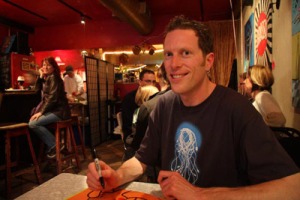What do authors think about editors? What do authors think makes the difference between a good editor and a great editor?
 Previously, BoldFace asked author Nina Munteanu about her experience working with editors. This time we posed the same questions to Jeremy Tankard, an award-winning Vancouver-based children’s author and illustrator. His books include Grumpy Bird and It’s a Tiger! and he recently illustrated Here Comes Destructosaurus!
Previously, BoldFace asked author Nina Munteanu about her experience working with editors. This time we posed the same questions to Jeremy Tankard, an award-winning Vancouver-based children’s author and illustrator. His books include Grumpy Bird and It’s a Tiger! and he recently illustrated Here Comes Destructosaurus!
Q&A conducted by Jennifer D. Foster
Overall, what’s your experience like as an author who’s been edited?
Nothing but positive, so far! I’ve been lucky enough to work with some of the biggest names in children’s publishing. They bring a LOT of experience and award-winning books to the table, so I’m all ears when they open their mouths to comment on my work. I haven’t been led astray, so far.
What is it like as an author to work, say, months, or even years, on a book, then have an editor read it critically and suggest (sometimes major) changes?
It can be a strange experience, sometimes: you think you know what you’ve done, but then someone can give you whole new ways of seeing it. I think, sometimes, as a writer, you can get much too close to your work. I rely heavily on my editor having a fresh and more distant perspective on things. She can see the big picture, whereas I’ve got hung up on details. Occasionally, editors have suggested major changes or rewrites, and those are certainly frustrating (or at least not what I want to hear at the time). However, I have a great deal of trust in their experience; so, while sometimes I’m not told what I want to hear, I know that they’re probably right. I know that they make suggestions because they believe it will make my book better—and I want it to be the best that it can be.
What do you think is the formula for a positive author/editor relationship?
Trust. Communication. A willingness to compromise. Sometimes a willingness to not compromise at all, but to follow blindly where they [the editor] suggest (that takes a LOT of trust!). A friendly and professional manner. Mutual respect.
What’s your advice for a writer working with an editor for the first time?
Keep an open mind. Remember that your writing isn’t precious. Remember that this person is trying to help you make the best book that you can possibly make (and it can ALWAYS be better). Keep in mind that it’s not all about you—you want your editor to be as invested in your writing as you are. Let your editor feel some ownership of your writing—the editor’s experience can make all the difference in the world.
What are the characteristics of a good editor? And a great one?
A good editor is one who can help you take your writing to places you never thought of. One who can respect and understand your “vision” intuitively. One who can oversee MAJOR rewrites and changes without ever compromising what is at the heart of your book. A great editor is encouraging and supportive throughout the process and is someone you want to work with again, when the labour of rewriting is over. For me it’s also important that I can share a laugh or two with my editor while we’re working on a project. I like it when it feels like we’re sharing in some hilarious joke before the rest of the world gets to hear it. And I like the editing/rewriting experience to be FUN!
Jennifer D. Foster is a Toronto-based freelance editor and writer, specializing in book publishing, magazines, and marketing and communications. Grumpy Bird is one of her all-time fave kids’ books.
This article was copy edited by Joe Cotterchio.

One thought on “Q&A: Author Jeremy Tankard on the author/editor relationship”